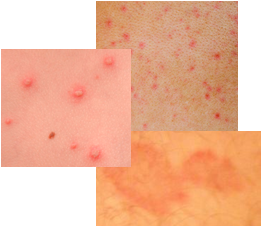Oily Face Causes
Visit this
PICTURES OF RASHES PAGE
An oily face or oily skin in general is a skin care problem for many individuals from any age, race, or gender.
The face usually experiences this skin problem in the forehead region, along the nose, and along the chin. In these areas of the face, the oil glands are bigger and more active. The neck, chest, and back areas also have many active sebaceous glands and oily skin can be a problem in these areas as well.
Visit the link oily face signs to help you determine your skin type and whether you have oily skin.
To properly care for oily skin, it is important to understand the reasons why oily skin occurs in the first place. In some cases, it is possible to avoid the causes of oily skin, whereas in others the individual may be stuck with this skin care problem for life.

Oily skin occurs when there is an overproduction of sebum. Sebum is an oily compound produced naturally by oil glands, known as sebaceous glands, in the skin. In the right amounts, this oil functions effectively to moisturize and protect the skin from the harsh environment we live in. However, in excess amounts, sebum will cause skin care problems. Most notable of the skin care problems are acne and acne related blemishes.
Let us take a closer look at why many people have an oily face or oily skin problem.
Genetics
Our genetic make-up determines how much oil our sebaceous glands will produce. As a result, the skin of some individuals will naturally produce more oil than others. If oily skin is a common problem in the family, then the odds are that you will also have the same skin care problem. There is not much that can be done because this condition is pre-programmed into our bodies. Fortunately, as a person ages, the sebaceous glands produce less oil and an oily face or oily skin becomes less of a problem.
Hormones and Hormone Imbalances
Certain hormones act on the sebaceous glands and stimulate them to produce more than the normal amount of sebum. Every person is different and every person’s oil glands are likely to respond differently to hormones.
During adolescence, there is a rise in the amount of sex hormones called androgens. These hormones, in addition to being responsible for the development of secondary sex characteristics, also stimulate and enlarge the sebaceous glands. Therefore, the skin produces more sebum or oil and teenagers often have oily skin. If the face or skin is not properly cleansed, then the excess oil will lead to acne, which of course is common in adolescents.
Pregnancy, menopause, and the use of birth control pills also create hormonal imbalances or changes in the levels of hormones in the body. Once again, this creates a situation where the oil glands get stimulated and produce more oil. The end result is an oily face or oily skin.
Cosmetics
If a person has an face that is oily, then oil-based cosmetics should be avoided. Oil based cosmetic products will simply aggravate the oily skin problem. Choose cosmetics and skin care products that are specifically formulated for oily skin. In addition, avoid greasy cold creams and lotions, which will also increase the oiliness of the skin.
Soaps and Skin Cleaning
Soaps and especially harsh soaps or high alcohol containing skin care products are not recommended for individuals with an oily skin problem. These products will disturb the skin’s natural protective layer and aggravate the sebaceous glands. These oil glands will then be stimulated to produce more skin oil, resulting in the oily skin problem becoming worse.
Washing the face too frequently also removes the skin’s essential oils and stimulates the oil glands to overproduce oil.
Diet
Some believe that certain foods lead directly to oily skin. Examples are chocolate, soft drinks, and greasy fried foods. However, there are no valid studies that connect these foods specifically to oily skin.
Nevertheless, diet still does play a role in whether you have an oily face or not. The important factor to consider is that if you have a good diet your body will function better. If your body is functioning properly as a whole, then there is a greater chance that the oil glands will also function as they should and not overproduce oil.
There is also a possible link between a deficiency in vitamin B2 and vitamin B5 and oily skin. A deficiency in these vitamins could promote the formation of an oily skin problem. Whole grains, beans, and nuts are good sources of these vitamins.
Other Oily Face Factors
In addition to the factors mentioned above, an oily face or oily skin may be caused by:
- some medications can lead to an increase in production of skin oil
- heat and humidity can also stimulate oil production from the glands and lead to an oily face
- the working conditions that an individual is exposed to on a daily basis can influence the amount of oil on the face
- smoking promotes the enlargement of skin pores and therefore the skin is able to excrete more oil to the surface of the skin
Related oily skin information:
oily skin care | basic treatments | natural treatments
